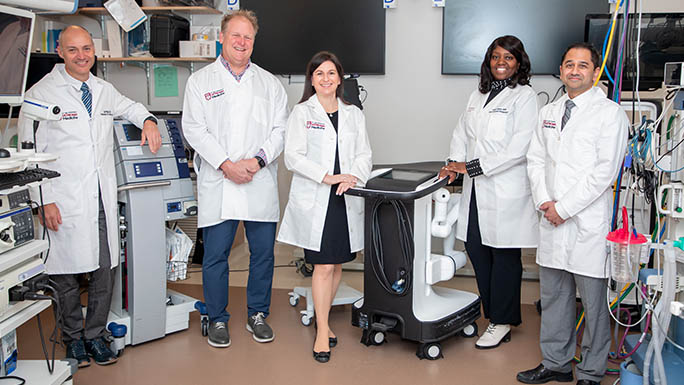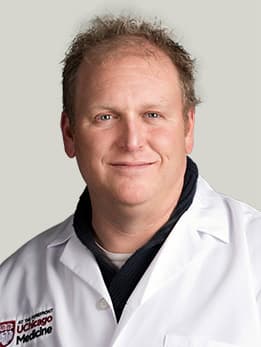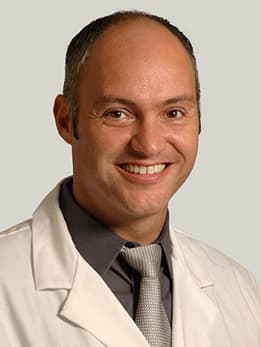Interventional Pulmonology & Advanced Bronchoscopy

Many lung diseases can be diagnosed and treated without surgery using advanced bronchoscopy. During these outpatient procedures, interventional pulmonologists pass a thin tube with a tiny camera (or scope) through the nose or mouth and into the lungs.
The University of Chicago Medicine is a leader in the field of bronchoscopy. Our interventional pulmonologists have decades of experience and are highly committed to improving care for people with lung problems. They continuously research new ways to treat patients by regularly engaging in clinical trials to test advanced approaches and emerging technologies.
As a result, our pulmonologists have repeatedly been the first in the Midwest to adopt state-of-the-art bronchoscopy methods. For instance, they have more experience than any other Illinois hospital in using robotic bronchoscopy, a breakthrough approach that allows pulmonologists to reach areas deep within the lung that were previously only accessible with surgery.
Our patients also benefit from timely and compassionate care. For example:
- UChicago Medicine provides bronchoscopy procedures five days a week (Monday through Friday). As a result, we can schedule patients for their procedures in less than a week, whereas most medical centers in the Chicago area schedule about a month out.
- Our team provides comprehensive services before, during and after a patient’s bronchoscopy. Our physicians and nurse practitioner educate patients and family on what to expect during and after the procedure. We also arrange any follow-up care or supplies that may be needed at home.
- Finally, we collaborate with the patients’ other physicians and caregivers to ensure that all care is coordinated. This team approach helps ensure that our patients benefit from the combined expertise of a variety of medical experts.
Diagnosis. Our interventional pulmonologists use sophisticated robotic bronchoscopy to determine whether a lung nodule (abnormal growth) is cancerous. Using a 3D roadmap of the patient’s lung, which is developed from imaging scans, our pulmonologists guide a flexible endoscope equipped with a camera and small tools through the patient’s mouth to the nodule in the lung. The pulmonologist then biopsies the nodule, or collects a sample of tissue, which is immediately lab tested for cancerous cells.
Staging. Our physicians are also leaders in using minimally invasive methods to biopsy lymph nodes in the chest cavity and lung — a key step in the staging of suspected lung cancer.
The process, called transbronchial needle aspiration, may be recommended after a CT/CAT scan reveals an abnormal lymph node, which may indicate lung cancer. Conventional lung biopsy methods usually require surgery to reach a lymph node and extract a tissue sample for biopsy testing.
With transbronchial needle aspiration, there is no need for exploratory surgery to reach the lymph node. Instead, the physician can pass a special needle through the bronchoscope to reach the specific lymph node and extract tissue for biopsy. This advancement means patients can avoid unnecessary diagnostic surgery.
Transbronchial needle aspiration is done on an outpatient basis and usually takes less than an hour to complete. Patients return home later the same day.
Management of cancer complications. When patients with lung cancer have trouble breathing, our pulmonologists can provide relief, using advanced bronchoscopy procedures to open up the airway. We offer tumor debulking by laser and cooling methods. We also offer a unique treatment using photodynamic therapy (PDT) to accurately destroy tumors that are encroaching into airways. Closed off structures can be dilated, and then a stent is placed inside them, helping patients breathe easier.
UChicago Medicine is recognized as one of the top medical centers in the United States for placing valves in the lung using BLVR. Our physicians were involved in prior research trials that helped bring these technologies to the United States.
Our interventional pulmonologists are experts in performing bronchial thermoplasty, which is now approved by the FDA. The procedure involves applying heat to the airway and lungs to smooth muscle tissue. This helps minimize airway constriction during asthma attacks.
Our interventional pulmonologists also use advanced bronchoscopy approaches to diagnose, treat, and relieve a variety of noncancerous lung and airway problems, including:
- Sarcoidosis
- Pleural disease or pleural effusion
- Interstitial lung diseases
- Lymphadenopathy (swollen lymph nodes)
- Infections within the lungs
- Complex airway diseases, such as bronchial stenosis and tracheobronchomalacia
Interventional Pulmonology Team
Sampling and Evaluating Lung Nodules and Masses: Expert Q&A
Pulmonologists D. Kyle Hogarth, MD, and Ajay Wagh, MD, talk about different ways physicians can detect and diagnose lung nodules and masses, including advanced bronchoscopy techniques that do not require incisions or surgery.
Request an Appointment
We are currently experiencing a high volume of inquiries, leading to delayed response times. For faster assistance, please call 1-888-824-0200 to schedule your appointment.
If you have symptoms of an urgent nature, please call your doctor or go to the emergency room immediately.
* Indicates required field



